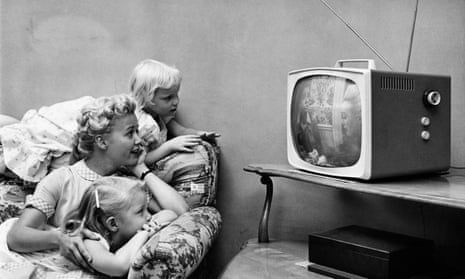I mistakenly expected David Thomson, the most imaginative and affectionate writer on cinema, to take a dim view of television. After all, the big screen usually treats the small screen with disdain. In Douglas Sirk’s All That Heaven Allows, widowed Jane Wyman is given a TV set by her children: it signals that they expect her to settle on her sofa and sink into meek, housebound obsolescence. Enraged by the fatuous sales pitches that drivel from a set in his motel room, the hero of Wim Wenders’s Alice in the Cities hefts his boot into the box, concusses it and gloats over the charred mess.
Thomson, however, understands the futility of such gestures. We can switch the set off, but the medium remains permanently and ubiquitously on; distending to cover the sides of skyscrapers in Times Square or shrinking to fit into our smartphones, it has taken over the world. We may grip a remote control but, Thomson warns, “we are not in charge”, because “technology is less our tool than something that makes tools of us”. Television values us as customers for the wares it sells, or as gloating spectators of deaths it is eager to broadcast live. Its eye, Thomson remarks with a shudder, is “impatient for terrible action” – Jack Ruby shooting Lee Harvey Oswald, Niki Lauda’s car exploding into flames, the Columbia space shuttle disintegrating as it re-entered Earth’s atmosphere.
Despite such qualms, Thomson is an immersive, promiscuous viewer. He venerates AJP Taylor, who delivered fluent television lectures on history without relying on notes or an autocue, but he also relishes the slurs and grimaces that are Judge Judy’s versions of the death penalty. He recently devoted 10 studious days to the boxed set of Breaking Bad, yet he sometimes randomly channel surfs, enjoying “the surreal linkage of alien things in the montage”.
As a Londoner transplanted to California, Thomson pays special tribute to the “comic insurrection” of British television. He marvels at the Hitlerian rants of John Cleese in Fawlty Towers, and believes that Ricky Gervais, with his filthy mouth and his equally offensive potbelly, is conducting a one-man campaign against the compulsory niceness and sameness of the American medium.
Although this engagingly anecdotal, excitingly speculative survey unfurls as a history, Thomson’s subtitle calls it a biography, perhaps because the dominance of television began around the time when he was born, which gave it, at least in its early years, an authority he describes as “parental”. For Thomson’s generation, growing up in an anxious world after 1945, television served as a communal pacifier. It was a domestic appliance, which assured us that we’d be safe at home. Sitcoms about suburban bliss devised spurious problems that could be solved within half an hour; laugh tracks coaxed us into agreement, while every few minutes commercials touted the brands of deodorant or detergent that would sanitise and sanctify our happy, affluent lives.
Thomson applauds Lucille Ball for laying waste to this suffocating idyll in the frenzied rampages of I Love Lucy. But he also touchingly recalls evenings spent watching Friends with his wife and children, content to share the hearth-like warmth the show exuded. Even in their local coffee shop, the six characters huddled on couches like television viewers, which made it easier for them to slide into those sexless group cuddles that cheered all of us up.

With the passing decades, the prospect inevitably clouds over. As a lad in south London, Thomson watched a blotchy relay of the coronation on a set his gran bought for the occasion; as a middle-aged man in San Francisco, he watched two passenger jets scythe through the World Trade Center towers, and nodded when his six-year-old son – a true child of the media age, or one of Plato’s deluded cavemen in juvenile form – asked: “Dad, what movie is this?”
Screens once convened a group and unified society, as on coronation day. Now, Thomson argues, they are “a measure of a necessary impacted solitude”. As the space we’re allocated on planes narrows, squeezing us up against our neighbours, we retain a notional privacy thanks to the monitor fitted to the seat in front: the body remains in prison, but our eyes can flicker through a hundred interchangeable in-flight channels. It all concludes – or else the next stage of our technology-driven evolution begins – with the Oculus Rift, displayed in the last of the book’s witty, startling illustrations: a helmet insulates your head and allows you to live in a virtual world. The experience, according to an early adopter, is as hallucinogenic as heroin.
When Thomson reaches the present, his gratitude for the affable, sociable medium has to struggle against an elderly pessimism. He comes back repeatedly to the threat posed by Donald Trump, reacting to him sometimes with contempt and sometimes with dread. He calls Trump a “scoundrel madman” created by and for the medium, “an inspired, mercurial handler of TV” who “can go from The Apprentice to being the apprentice’s sorcerer in one blithe insult”. He covets the presidency, Thomson suggests, because it will guarantee him unlimited access to television, especially if he happens to be declaring war.
Yes, I can see it now: puffed up to the size of the jumbotrons used in sports stadia, a permatanned face topped by a saffron quiff glares into the camera and tells the entire human race, “You’re fired!” Then, at last, the soothing, bantering, cornucopian screen will go dark for ever.
Television: A Biography is published by Thames & Hudson (£19.95). Click here to buy it for £16.36

Comments (…)
Sign in or create your Guardian account to join the discussion